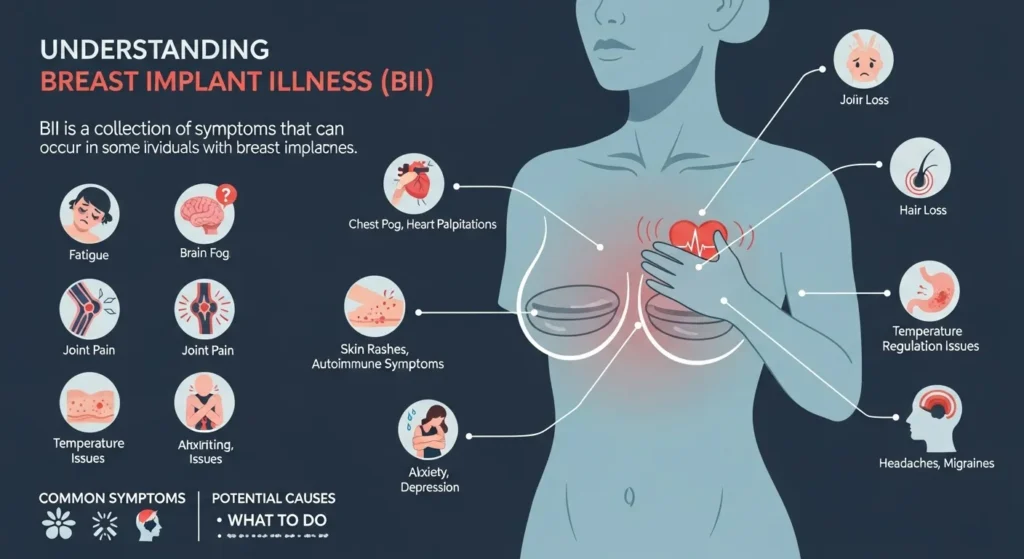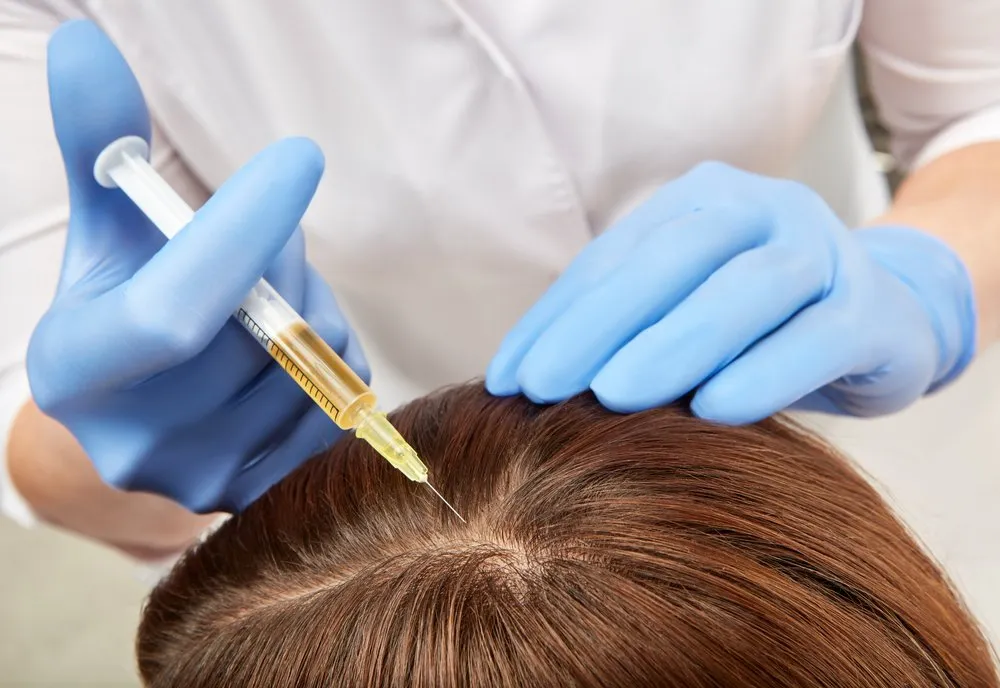Are you experiencing unexplained hair thinning and wondering, Does BII cause hair loss? Breast Implant Illness (BII) is a cluster of symptoms reported by women with breast implants, ranging from fatigue to autoimmune responses. Among the lesser-discussed symptoms is hair loss—an issue that can be both distressing and confusing.
In this article, we explore whether there’s a link between BII and hair loss, what science currently says, and what your options are for diagnosis and treatment. Gain clarity with expert-backed insights and real recovery stories to guide your next steps confidently.
What Is Breast Implant Illness (BII)?

Breast Implant Illness (BII) is not a medically recognized diagnosis, but it’s widely reported by thousands of women worldwide. It refers to a range of systemic symptoms that some individuals develop after receiving breast implants.
Overview of BII Symptoms
Common symptoms include:
- Chronic fatigue
- Joint and muscle pain
- Brain fog and memory issues
- Autoimmune-like symptoms
- Hair thinning or excessive hair shedding
- Skin rashes or dryness
These symptoms may develop gradually and vary widely from person to person.
How BII Affects the Body Systemically
BII is believed to trigger systemic inflammation or immune dysfunction. The body may perceive the implant as a foreign object, potentially leading to widespread symptoms that extend beyond the breast area.
Autoimmune Responses Triggered by Breast Implants
In some cases, BII is associated with autoimmune conditions like Hashimoto’s thyroiditis or lupus. These immune responses can disrupt hormonal balance, damage hair follicles, and impair nutrient absorption—factors that contribute to hair loss.
Can BII Cause Hair Loss?
Hair loss is one of the more under-recognized symptoms of BII, yet it’s a significant concern for many women.
Inflammatory and Hormonal Disruption
Chronic inflammation can interfere with the natural hair growth cycle. Additionally, if BII affects thyroid function or estrogen balance, this hormonal disruption may trigger telogen effluvium—a condition where hair enters the shedding phase prematurely.
Stress, Nutrient Deficiency, and Hair Cycle Disruption
BII-related stress—both emotional and physiological—can deplete nutrients essential for hair growth, such as:
- Iron
- Zinc
- Vitamin D
- Biotin
This nutritional stress can weaken the hair shaft, cause breakage, or lead to diffuse hair thinning.
Scientific Evidence Linking BII and Hair Loss
What Current Research Says
There is no direct, peer-reviewed study that definitively proves BII causes hair loss. However, several studies suggest silicone implants may provoke immune or inflammatory reactions that indirectly impact hair health.
Medical Opinions and Expert Insights
Many experts believe BII-related hair loss is likely multifactorial, driven by inflammation, nutrient deficiencies, and autoimmune stress. Dermatologists and plastic surgeons recommend evaluating each symptom within a broader systemic context.
Limitations in Research and Need for More Studies
Current evidence is mostly observational or anecdotal. More robust, controlled studies are needed to confirm causation and establish treatment protocols for BII-induced hair loss.
Other Causes of Hair Loss After Breast Implants
Not all hair loss following breast augmentation is due to BII. Here are other contributing factors:
Surgical Stress and Anesthesia
The physical stress of surgery can lead to temporary hair shedding (telogen effluvium) that resolves in 3–6 months.
Medication-Induced Hair Shedding
Painkillers, antibiotics, or other post-op medications can interfere with the hair cycle, particularly in sensitive individuals.
Lifestyle Factors Post-Surgery
Postoperative fatigue, reduced physical activity, and poor appetite can lead to nutrient imbalances that affect hair growth.
When to See a Doctor About Hair Loss
Warning Signs to Watch For
- Hair falling out in clumps
- Receding hairline or bald patches
- Itching, burning, or scalp tenderness
- Worsening fatigue or memory issues
Diagnosis and Evaluation by Dermatologists or Plastic Surgeons
A comprehensive evaluation includes:
- Medical history review
- Scalp examination
- Hair pull test
Blood Tests and Hair Analysis
Doctors may request labs to check:
- Thyroid hormones (T3, T4, TSH)
- Iron and ferritin levels
- Vitamin D and zinc
- Autoimmune markers (ANA, CRP)
Treatment Options If You Suspect BII-Related Hair Loss
Nutritional Support and Hair Supplements
Essential supplements include:
- Biotin
- Iron (if deficient)
- Omega-3 fatty acids
- Collagen peptides
Anti-Inflammatory and Autoimmune Treatments
Some patients benefit from:
- Corticosteroids
- Immunomodulatory diets (anti-inflammatory, gluten-free)
- Medical detoxification protocols under supervision
Considering Explant Surgery — Does Hair Grow Back?
Many patients report gradual hair regrowth within 3–12 months after explantation, particularly when accompanied by a supportive recovery protocol. However, results vary based on individual health, implant duration, and underlying conditions.
What Happened After the Explanation?
- Improved scalp circulation
- Reduced inflammation
- Balanced hormones
- Normalized shedding cycle
Recovery Timeline for Hair Regrowth
| Time Since Explant | Common Hair Recovery Observations |
|---|---|
| 0–3 months | Hair loss may persist temporarily |
| 3–6 months | Less shedding, early regrowth |
| 6–12 months | Visible volume and density gains |
Expert Recommendations on Managing Hair Loss from BII
What Plastic Surgeons and Trichologists Say
Dr. Rana Irfan, a hair restoration expert in Islamabad, recommends addressing hair loss holistically—by targeting inflammation, optimizing nutrients, and exploring explant options if symptoms persist.
Tips for Supporting Hair Health During Recovery
- Eat anti-inflammatory foods (berries, greens, fatty fish)
- Stay hydrated
- Get 7–8 hours of sleep
- Avoid tight hairstyles and harsh chemicals
Integrative Medical Approaches
Combining conventional care with holistic strategies like acupuncture, scalp microneedling, or PRP therapy can accelerate hair regrowth.

Frequently Asked Questions (FAQs)
Does hair grow back after removing breast implants?
Yes, in many cases, patients experience hair regrowth within 6–12 months post-explant, especially if hair loss was linked to BII.
How common is hair loss with BII?
Hair loss is not the most common symptom, but is frequently reported, particularly alongside fatigue and hormonal imbalance.
Can silicone implants trigger autoimmune hair loss?
Silicone has been linked to immune system activation, which can lead to autoimmune symptoms, including hair shedding.
What tests can confirm if BII is causing my hair shedding?
There is no single test for BII, but blood panels, hormone tests, and autoimmune markers can help rule out other causes.
Take Your Next Step
If you’re experiencing unexplained hair loss and suspect it may be linked to your breast implants, don’t wait. Book a consultation with Dr. Rana Irfan today—Pakistan’s trusted expert in hair restoration. Get personalized solutions backed by science and compassionate care.
